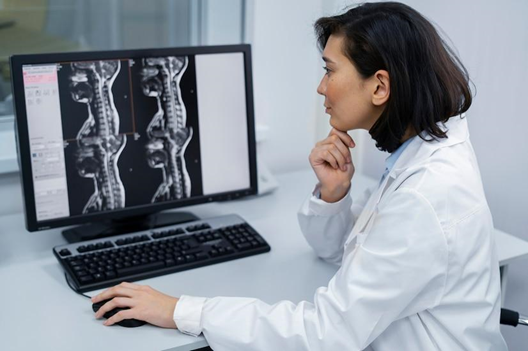The Use Of CT Scans To Evaluate Immune System-Related Inflammation

Inflammation is a vital immune response that fights infections and heals tissues. However, chronic inflammation can lead to health issues such as autoimmune diseases and allergies. Monitoring inflammation levels is essential for managing these conditions.
CT scans, traditionally used for visualizing internal structures, are also used to assess immune-related inflammation. They provide detailed images of inflamed areas, helping physicians determine the extent and location of inflammation, guiding diagnosis treatment, and monitoring therapy effectiveness over time. This enhances the ability to offer personalized treatment and improve patient outcomes.
Understanding Immune System-Related Inflammation
Immune system-related inflammation is a natural response to harmful stimuli to eliminate threats and initiate tissue repair. This process involves immune cells, signaling molecules, and increased blood flow to restore balance. However, when inflammation becomes chronic, it can lead to health issues like autoimmune diseases and cardiovascular disorders, damaging healthy tissues and organs. An immune system specialist plays a crucial role in understanding the mechanisms behind inflammation and developing effective treatments. Imaging techniques like CT scans are invaluable in visualizing inflammation, helping healthcare providers create targeted interventions that improve patient outcomes.
The Role Of CT Scans In Evaluating Inflammation
CT scans are essential for evaluating inflammation. They provide high-resolution, cross-sectional images that reveal the location and extent of inflammation. Unlike X-rays, CT scans offer detailed views, allowing healthcare providers to assess severity and treatment options. Using advanced algorithms, CT scans capture images from multiple angles, visualizing structural changes and functional aspects like swelling. Contrast agents can enhance visibility, highlighting active inflammation and increased blood flow. This comprehensive approach makes CT scans crucial for diagnosing and monitoring inflammatory disorders.
Benefits Of Using CT Scans For Immune System-Related Inflammation
CT scans offer several benefits in evaluating immune system-related inflammation. They provide rapid imaging, enabling quick diagnosis and intervention, which is crucial in emergency or acute situations. With superior resolution, CT scans detect subtle changes, especially in complex areas like the abdomen or chest, aiding accurate diagnosis. Additionally, CT scans help monitor disease progression and efficacy by tracking inflammation changes over time, allowing personalized treatment adjustments. This comprehensive approach improves patient care and supports informed decision-making.
Common Conditions Where CT Scans Are Used To Evaluate Inflammation
CT scans are crucial for assessing conditions associated with immune system-related inflammation, such as inflammatory bowel diseases (IBD) like Crohn’s disease and ulcerative colitis. They help visualize the extent of inflammation, detect complications, and monitor disease activity. CT scans identify inflammation and fluid collection areas in respiratory infections like pneumonia and guide treatment. Additionally, CT scans evaluate conditions like vasculitis, rheumatoid arthritis, and cancers. They provide detailed images to improve diagnosis and management, ultimately enhancing patient outcomes.
CT Scan Procedure For Evaluating Immune System-Related Inflammation
The CT scan procedure for evaluating immune system-related inflammation begins with a consultation, where the healthcare provider recommends the scan based on symptoms. The patient will change into a gown and remove metal objects. The patient lies on a motorized table during the scan, which moves through the CT scanner. The procedure is quick, taking just a few minutes, and may involve holding the breath briefly. A contrast agent may be administered for more precise images of inflamed areas. Afterward, a radiologist analyzes the images and provides a report, helping guide further clinical decisions. The procedure is non-invasive and well-tolerated.
Interpreting CT Scan Results For Inflammation
Interpreting CT scan results for inflammation involves assessing anatomical structures and identifying signs like swelling, fluid accumulation, or tissue density changes. Radiologists look for specific patterns to differentiate inflammatory conditions, such as bowel wall thickening in inflammatory bowel disease or consolidation in respiratory infections. The patient’s history and symptoms are also crucial for accurate interpretation. By combining imaging findings with clinical information, radiologists help guide effective treatment decisions. Tellica Imaging, https://tellicaimaging.com/, emphasizes advanced imaging services that assist healthcare providers in making informed decisions and ensuring targeted, personalized care for patients with inflammatory conditions.
Potential Risks And Limitations Of Using CT Scans For Inflammation Evaluation
CT scans are invaluable for evaluating inflammation but come with risks and limitations. The main concern is radiation exposure, especially for vulnerable populations like children, requiring careful consideration of necessity. Additionally, CT scans provide structural but not functional insights, which may not pinpoint the underlying cause of inflammation. Contrast agents also pose risks for patients with kidney issues or iodine allergies. Despite these concerns, CT scans remain a powerful tool, with healthcare providers weighing the risks and benefits for each patient.
Alternative Imaging Techniques For Evaluating Immune System-Related Inflammation
In addition to CT scans, alternative imaging techniques for evaluating inflammation include MRI, ultrasound, and nuclear medicine imaging. MRI, which uses magnetic fields and radio waves, excels at visualizing inflammation in joints and the central nervous system, offering detailed images without ionizing radiation. Ultrasound provides real-time, non-invasive imaging that is ideal for assessing superficial structures like muscles and joints and guiding procedures. Nuclear medicine imaging, such as PET scans, detects metabolic activity to evaluate tissue function and is often used alongside other modalities to assess disease activity in conditions like cancer and autoimmune disorders. The choice of imaging depends on the clinical scenario and diagnostic needs.
Conclusion: The Importance Of CT Scans In Diagnosing And Monitoring Immune System-Related Inflammation
In conclusion, CT scans are essential for evaluating immune system-related inflammation, offering high-resolution images that aid in accurate diagnosis, disease monitoring, and treatment assessment. Their rapid imaging capabilities are particularly valuable in acute settings for timely interventions. Despite some risks and limitations, the benefits of CT scans in diagnosing complex inflammatory conditions are significant. Understanding the connection between inflammation and the immune system helps healthcare professionals use imaging effectively in patient care. As medical technology advances, combining CT scans with other imaging methods will enhance diagnostic accuracy and enable personalized treatment for patients with immune system-related inflammation.







